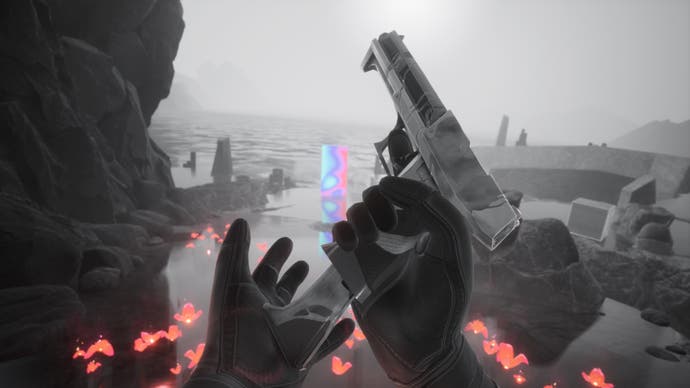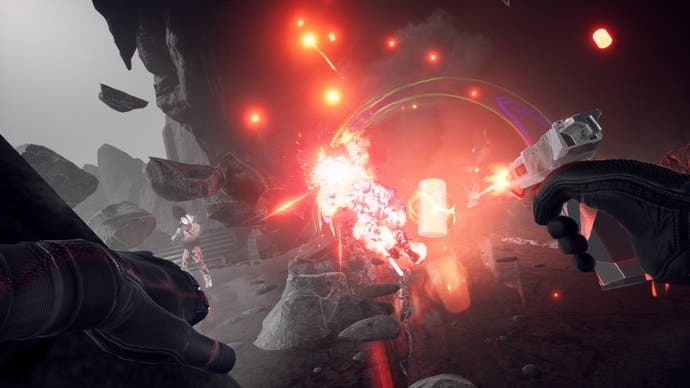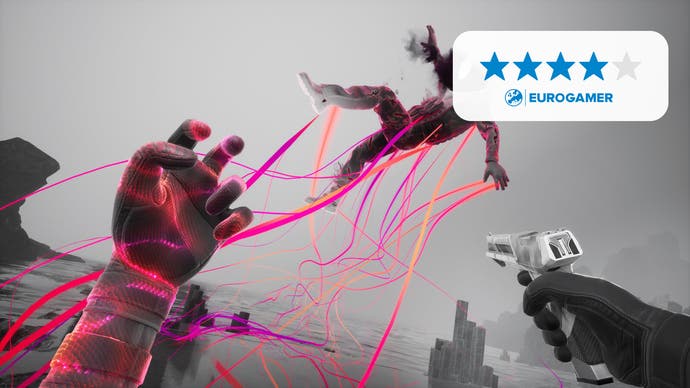Synapse - a pure power fantasy that epitomises everything great about virtual reality
A dream within a dream.
It starts with a squeeze of the trigger and a flick of my left wrist. Where once stood an enemy, gun raised and pointed in my direction, there's now an empty space. Looking up I follow the body as it arcs through the air, and there I catch it with my telekinesis powers and slam it into the ground below where it smashes into digital shards on jagged, monochromatic rocks.
Spotting a group of enemies hiding behind cover I reach out with my telekinetic powers and use them to lift an explosive barrel into position above their heads. Then, with a simple clench of my fist, the barrel explodes sending rocks and bodies flying in all directions.
Later, while holding an SMG in my right hand, I use my psychic powers to snatch a flying Sentinel enemy out of the air and pin it to the floor before peppering its body with bullets until it explodes and melts away.
I feel like Darth Vader at the end of Rogue One. I feel unstoppable, I feel superhuman and I feel nothing for the foes I'm crushing. This is a pure power fantasy. This is what VR is all about. This is Synapse.
Developer nDreams has built up a reputation in the VR space for creating imaginative and highly polished virtual reality games, and its latest release, Synapse, feels like a culmination of everything the studio has learnt so far.
The premise of Synapse is simple: you're a special agent on a mission to break into the mind of a rogue Colonel (played by David Hayter) and uncover and ultimately stop his plans for some kind of devastating terrorist attack. Your handler (Jennifer Hale) accompanies you for this dive into the sleeping man's subconscious via a communicator and, as you make your way through the game, these two disembodied voices bicker and taunt each other, and you slowly uncover their motivations as they do so.
It's an OK story of sci-fi espionage that adds a bit of intrigue to the proceedings, but its twists and turns are fairly predictable. Really this narrative is only there to add a bit of direction to the meat of the game, which is an immensely heady mixture of both firepower and psychic powers. But you don't start off with a full repertoire of powers of course, some need to be learned and earned and you do this by jumping into the Colonel's mind again and again in order to complete small objectives or 'Revelations' as they're called. Completing these Revelations earns you points with which you can purchase upgrades at the end of each run, be it successful or not, in a very basic roguelike manner.

These upgrades include things like new guns, health font spawns at certain locations and more health and ammo capacity. However the obvious stars of the show are the telekinetic powers. You start off quite limited in what you can actually do with them - you can throw boxes, or Mental Blocks as they're called in the game, or you can explode barrels in order to create some lovely splash damage. Upgrades give you much more flexibility, though, and soon you'll be able to reel objects in and out and attack enemies with them with more precision and best of all, pluck enemies from where they stand and fling them into the air, or simply wallop them against walls until they expire.
Selecting which objects you want to snare with your psychic grasp feels incredibly intuitive thanks to the PSVR2's eye-tracking. Most other PSVR2 games I've seen limit the eye tracking to foveated rendering or maybe a fancy way to navigate menus but, as a PSVR2 exclusive title, Synapse takes full advantage of everything that Sony's headset has to offer and it utilises the eye-tracking impeccably.
Any interactive object you look directly at will instantly be highlighted and once it is, whoosh, you can throw throw it or explode it or - hell! - you can even juggle it for a bit before shooting it with a gun. It feels so natural to do, and it works almost flawlessly at first. On harder difficulty levels with huddles of enemies I'd occasionally struggle to grab the exact thing I wanted in all of the hustle and bustle, but it's certainly nothing that breaks the game.
Every facet of Synapse seems to have been fine-tuned in order to make everything you do in it feel effortlessly cool. The weapons are rather uninspired, there's four of them, a pistol, a shotgun, an SMG and a grenade launcher, but the way they are implemented is genius. Instead of going for the super realistic reloads that you might see in a game like Pavlov, here the action is distilled down to a button press and a swipe of your off-hand.
.jpg?width=690&quality=75&format=jpg&auto=webp)
This might seem a bit too simple and arcadey for helmet-heads who love realistic mil-sims, but in Synapse this streamlined reload mechanic lets you concentrate on how to go about maximising your psychic attacks. Chaining these together by throwing an enemy into the air and headshotting them as they fall down is such a 'chef kiss' moment, while psychically catching a thrown grenade in mid air and then returning it to sender for instant karma is delightfully trollish.
The fact that you can do all of this sitting down too means that all this tossing is nowhere near as intensely physical as it sounds. Obviously you can play standing as well, but I was perfectly comfortable playing the whole thing seated and I rarely felt tired, even after doing two hour long runs one after the other. Along with all the standard comfort settings you'd expect from a VR game nowadays (except for teleportation movement - new VR adopters beware!), there are also headset and controller haptics, but they're fairly gentle and only really noticeable if you're getting pummelled in the face by a mini gun.
The visuals also are quite gorgeous, with the majority of the action taking place in monochromatic environments that are occasionally lit with stylish splashes of colour which denote points of interest or objects that you can interact with psychically. It all looks wonderful through the 4K HDR lenses of the PSVR2 and I hardly noticed the much maligned mura effect that internet commenters moaned about during the headsets launch window.
As an aside, for those who care about these things, Synapse is reprojected to run at 120hz rather than a native 90hz. This fact meant nothing to me before I googled it and honestly, even after knowing what it means, I still couldn't tell from playing the game that any of the rendered frames were artificial. To my eyes the game ran silky smooth and I never once ran into any visual anomalies that pulled me out of the experience.

As much as I did love playing Synapse though, it certainly isn't perfect. Much like nDreams previous VR shooter game, Fracked, Synapse is rather short, even with the multiple full runs needed to see the story through to completion. It's nowhere near as short as Fracked, which had an incredibly thin run-time of around 2 hours but, according to my PS5, I still managed to fully complete Synapse's story and Platinum the game's trophies within 8 hours of starting it.
Being so good that you want the experience to go on for longer is hardly the worst problem that a game can have, sure, but even with Synapse's roguelike randomness, by the time you're on your second run through you will start to notice a severe lack of variety to the gameplay. There are only four enemy types, for example, and, while they are introduced slowly, once you've fought each of them a couple of times you'll soon find that they have easily exploitable weaknesses that make them all fairly simple to dispatch.
The mindscape levels themselves also become way too familiar over time. Even though Synapse's gameplay does feel much closer to a rogue-like than anything else, its levels are not procedurally generated, which is a feature that you'd normally expect to see in a game like this. Instead, each level is a pre-made arena with a couple of random spawn points that, at the beginning of the game at least, do a great job of tricking you into thinking they're more varied than they actually are. After extended playtime though you do start to recognise familiar sights and in turn learn the layouts of each area, something that eventually robs the game of its uniqueness.
This is especially true for the 'Memory Gate' levels that mark the mid and end points of each run. These levels are way more linear than the others and because of this it's easy to form habits and find favourite routes when you play them. For me, this went against the experimental arena style combat that made the gameplay feel so intoxicating at the start and instead, after pushing through the Mind Gate levels multiple times, they felt less like an organic adventure and more like ticking off a checklist.
.jpg?width=690&quality=75&format=jpg&auto=webp)
And then finally there's the telekinesis powers themselves. Ultimately they're the source of almost all the fun in the game and I had an absolutely wild time wielding them, but it does get to a point where you perhaps become a bit too powerful. Runs on harder difficulty levels do throw tougher, more accurate enemies at you with a higher frequency but, once you've got to grips with the mechanics and you've unlocked the ability to lift and throw enemies, it can feel like you're just wandering around swatting flies, rather than wading through a hazardous battleground.
Yet even with these minor issues, the sandbox way in which you can play with your powers and your weapons still offers way more replayability than your standard short VR experience does. If you're anything like me, Synapse is a game that you'll pick up and play and then won't be able to put down again until you've gotten absolutely everything out of it that you can.
I've played plenty of games that feature telekinetic Force-like powers in flat-screen form but there's a magic here and a sense of 'being' that only VR can deliver. This believability, this almost tangible way in which you can interact with the world around you brings those childish Jedi dreams bursting to life, and this in turn makes Synapse a must-buy game that deserves to be played by anyone who owns a PSVR2.





.jpg?width=291&height=164&fit=crop&quality=80&format=jpg&auto=webp)
